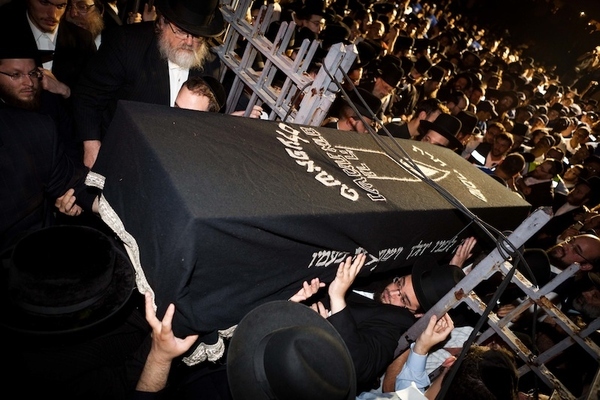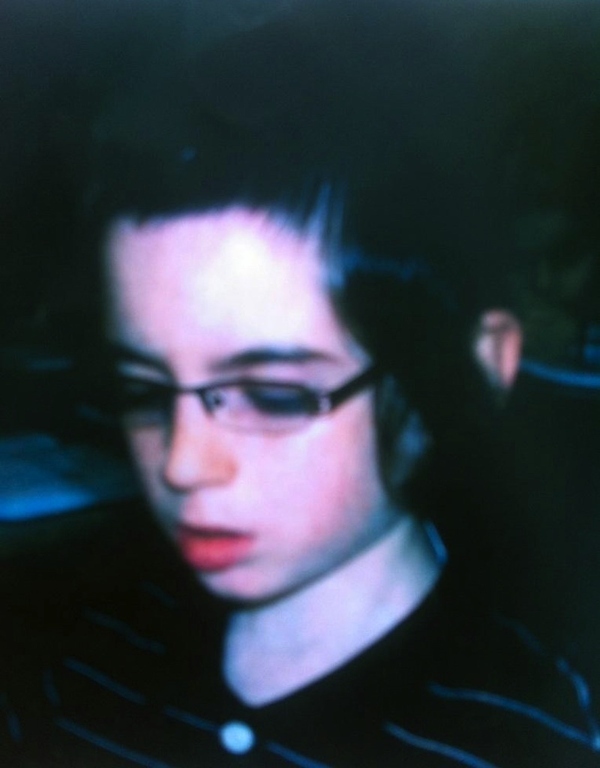Man Who Confessed To Killing 8-Year-Old Boy Says He Hears Voices
The lawyer for Levi Aron, the 35-year-old suspect who confessed to murdering and dismembering 8-year-old Leiby Kletzky, says Aron hears voices and is prone to hallucinations. Police say there is still no clear motive in this horrific crime.
-

Defense attorney Pierre Bazile speaks on behalf of Levi Aron, left, at his arraignment before Judge William Miller in Brooklyn criminal court, Thursday, July 14, 2011, in New York. Aron, 35, is charged with luring 8-year-old Leiby Kletzky to his home on Monday, and then smothering him and chopping him up when he learned that a search was under way for the missing child. Detectives found the boy's feet in Aron's freezer. (AP Photo/Louis Lanzano, Pool) NEW YORK (AP)--A man accused of kidnapping, killing and dismembering an 8-year-old boy who asked him for directions was ordered Thursday to undergo a psychological evaluation after his lawyer told a judge that his client might be mentally ill. "He has indicated to me that he hears voices and has had some hallucinations," said the attorney, Pierre Bazile. Levi Aron, 35, pleaded not guilty to charges of murder and kidnapping as prosecutors said he lured Leiby Kletzky to his home Monday after the little boy got lost while walking home from an Orthodox Jewish day camp. Video cameras captured the fateful encounter between the two on a Brooklyn street, while Leiby's mother waited anxiously just a few blocks away. Detectives later found the boy's severed feet, wrapped in plastic, in the man's freezer, as well as a cutting board and three bloody carving knives.
-
-
At his arraignment Thursday afternoon, Aron appeared disheveled, confused and pale. He stayed quiet during the brief court proceeding. As he was led out of the courthouse holding cells, other inmates screamed obscenities at him. He was held without bail, placed on suicide watch and protective custody after his lawyers said they feared he could do harm to himself. Police and prosecutors said Aron, a clerk at a hardware supply store, has confessed to suffocating the boy with a bath towel, but they continued to work on verifying his horrific and bizarre explanation for the boy's death. At the Kletzky household, his family also looked for answers, too. "Why?" asked Shmuel Eckstein, a family friend, as the boy's parents and five sisters sat and prayed. "We don't have that ... What we know is that through Leiby's death, God is sending us a huge signal--that we're doing something terribly wrong. And we're looking for what it is." He added that the family was not looking for retribution. "We're not into revenge," he said.
-

The casket carrying Leiby Kletzky, 8, is carried through a crowd of mourners for a funeral service in the Brooklyn borough of New York Wednesday, July 13, 2011. The boy, who got lost while walking home alone from day camp in his Orthodox Jewish Brooklyn neighborhood, was killed and dismembered by a stranger he had asked for directions, and his remains were found stuffed in a trash bin and the man's refrigerator, police said Wednesday. (AP Photo/John Minchillo) At a news conference, Police Commissioner Raymond Kelly said Aron told investigators that after taking Leiby off the street Monday, he brought the boy to a wedding in the suburbs about 35 miles away and spent several hours there. Other wedding guests confirmed Aron was there but didn't see the boy, the commissioner added. By the time the pair returned to the city, it was so late that Aron decided to take Leiby to his home to sleep and left him there Tuesday while he went to work, according to the police version of the confession. Kelly said the hardware supply store confirmed that Aron showed up as usual that day. Aron told police he killed Leiby when he got home after being spooked by a massive search for the boy in Borough Park section of Brooklyn, home to one of the world's largest communities of Orthodox Jews outside of Israel. Thousands of volunteers from the Hasidic community had assembled Monday evening to comb the streets, and the entire neighborhood was in a frenzy Tuesday over the lost child. Aron is Orthodox but not Hasidic. The Hasidim are ultra-Orthodox Jews.
-

Detectives walk Levi Aron, center, to a police car at the Brooklyn borough of New York's 67th precinct on Thursday, July 14, 2011. Aron is accused of killing eight-year-old Leiby Kletzky, who disappeared while walking home from a Brooklyn day camp. Aron told investigators that he suffocated the child before a massive search led to the discovery of his dismembered remains, according to a law enforcement official. (AP Photo /David Karp) "When I saw the fliers, I panicked and was afraid," Aron said, according to police. Investigators have said Leiby may have been tied up and tried to fight off his captor before he was killed. Kelly said Aron had scratches on his arms, wrists and elsewhere--a sign "there was some kind of struggle." There also were marks on the boy's remains that could have been caused by restraints, the commissioner added. A preliminary medical examination indicates Leiby was "smothered or suffocated," but it remained unclear when that happened, Kelly said. The medical examiner's office said further study was required. The commissioner also confirmed reports that Aron had given a written confession in Leiby's gruesome slaying that ended with, "I'm sorry for the hurt that I caused." Beyond that, "he hasn't expressed any remorse," Kelly said. In his confession, Aron recounted how he dismembered the boy, put some of the body parts in a freezer and took a shower, police said. He then put some remains in a suitcase and drove around with it for 20 minutes before putting the suitcase in a trash bin. Aron has denied molesting the boy, but Kelly said police still consider that a possibility. Brooklyn District Attorney Charles Hynes said investigators were looking at whether Aron might have had any improper contact with children in the past. Detectives were also examining three computers seized from his home, and searched the backyard.
-

This undated photo provided by the New York City Police Department shows eight-year-old Leiby Kletzky. (AP Photo/NYPD) Officials said the killing stands out because there's no clear motive. "It defies all logic and I think that's what's been so terribly disturbing about this case," Commissioner Kelly said. "There's absolutely no reason. There's nothing more innocent than an 8-year-old child and to be killed in this manner is just heart breaking." Izzy Goldstein, manager of the Ateres Charna event hall where the wedding took place on Monday, said police had downloaded security video from the hall's closed-circuit cameras, but he did not know if the suspect appeared in the footage. A woman who attended the wedding said it was for Yakov Morsel of Monsey and Dina Munk of Far Rockaway. Noami Schlesinger, 47, of Monsey, said she did not think Leiby had been there. Police haven't been able to confirm Aron's claim that he left the boy in the car during the wedding. The event hall is in the village of New Square, one of several communities in Rockland County populated by ultra-orthodox Jews who moved from Brooklyn in search of cheaper housing and a suburban lifestyle. Aron's lawyer, Bazile, said his family wished to "extend their condolences to the family of the boy," but wouldn't make any further statements. Zahava Farbman, a social worker with the nonprofit Chai Lifeline, said Leiby's five sisters "do not know the details of how he was murdered--just that a man killed him, but not how. It's too much, too soon." "They're devastated," Farbman said. "They'll eventually be told exactly what happened, but not now." The father, Nachman, works for a messenger company. The mother, Esti, is a homemaker. Friends and community leaders were setting up a fund for the family, who lives modestly. On the entrance of their apartment building, a printed sign warns visitors: "DO NOT share rumors, stories, and information you have heard." Another nearby notice asks people to respect the family's privacy.
